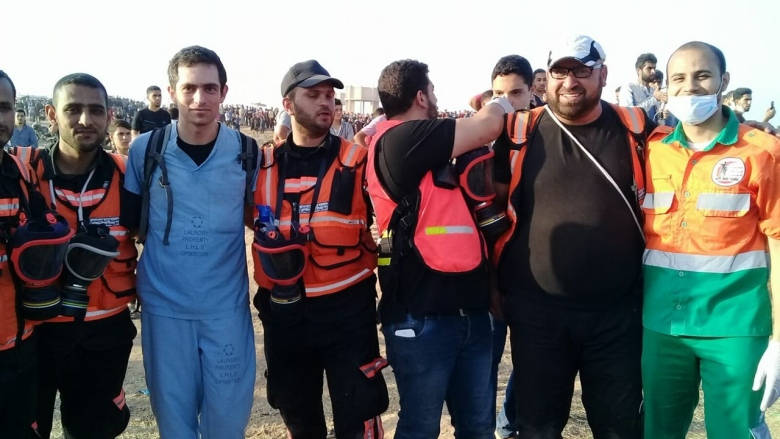Canadian doctor, who was 1 of 19 medical professionals shot Monday, believes he was targeted

An Ontario physician who works at the London Health Sciences Centre has been shot in the leg while delivering emergency medicine to protesters on the Gaza Strip.
Dr. Tarek Loubani said it happened during a “lull” in the protest Monday, as he was standing with a group of paramedics about 25 metres away from the protest area.
“There were no fires, there was no smoke. We had clear lines of sight to all three fortified sniper posts,” said Loubani.
“All of the sudden I heard a bang, and I found myself on the ground. I looked at my leg, I saw blood.”
19 medical professionals shot
Loubani said his colleague, a paramedic named Musa Abuhassanin, came over and began working on his injured leg.
About an hour later, Abuhassanin was shot and killed while attempting to rescue another person, Loubani said.
All in all, Loubani said a total of 19 medical professionals were shot Monday.
The day was one of the deadliest in Gaza since 2014. Israeli forces killed 59 Palestinians and injured another 2,700. Of those injured, the Gaza Health ministry said 130 were in serious or critical condition.
“The first rule of medical rescue is that you don’t become part of the situation, you’re no good to anybody if you’re shot too,” said Loubani, adding that his team had taken extraordinary measures to identify themselves to snipers as medical professionals.
Loubani wore a full green outfit; the paramedics wore high-visibility vests.
“I know gunshots; I know how to stay safe as well,” said Loubani. “Sometimes I do things wrong, but yesterday was not one of those days.
“Yesterday I did everything right, and it’s very hard to believe I wasn’t specifically targeted, considering that there was a lull in activity, considering the fact that I was so clearly marked.”
Thomas Woodley, president of Canadians for Justice and Peace in the Middle East, said firing on medical personnel is forbidden by the Geneva Convention.
“Certainly, Dr. Loubani and his colleagues were clearly wearing emergency medical clothing, and they should have been spared any sort of violence from the Israelis,” said Woodley.
CBC News reached out to Foreign Affairs Minister Chrystia Freeland for comment. In an email statement, spokesperson Adam Austen said the ministry is concerned about the shooting.
“Parliamentary secretary Omar Alghabra, as well as consular officials, have been in touch with his family earlier today,” said Austen.
“Canada is very deeply saddened and deplores the violence that has occurred in the Gaza Strip. It is appalling and inexcusable that civilians, members of the media, first responders, and children have been among the victims.”
Loubani said he hopes to stay in the area, but that his leg injury means he won’t be able to work on the front lines. He plans to continue working in the emergency department if his health allows.
Loubani’s work in the Middle East
Loubani works with the London Health Sciences Centre and the Schulich School of Medicine and Dentistry, and is known for his work in the 3-D printing of medical devices. He had been in the region, in part, to work on a newly developed 3-D printed tourniquet to stop serious bleeding from gunshot wounds.
Loubani said the tourniquets are in high demand because the border blockade makes it difficult to transport medical supplies in and out of the region.
When Loubani was shot, he said his colleague Auhassanin asked if he wanted a tourniquet himself.
Loubani said he declined.
“I knew that if I was in Canada I would be tourniqueted, but there just were so few of them and I knew there would be so many more injuries and fatalities. So I said no. He bandaged me up and I went,” said Loubani.
“I have always known that one day [the tourniquet] would be used on me, so that’s tremendous incentive to get it right. We want it to be as good as the stuff on the market.”
Loubani said his main objective has stayed the same: to make sure that patients on the Gaza Strip — or anywhere in the world — can access the same level of care as those at London Health Sciences Centre.
He said that can be difficult to do.
“If you were to take London Health Sciences and throw 2,400 injuries at them, what would they do? And at the end of it, how many doctors would be left standing?” said Loubani.
“It’s normal when you see so much death and destruction to yourself die a little and be destroyed a little …. We’re disappointed to not give our patients the care they deserve.”
